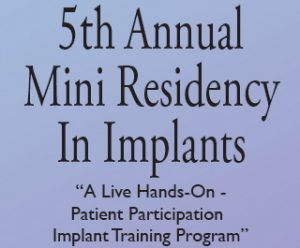
Everyday, I receive invitations to dental courses they call ‘mini-residencies’. What is a mini-residency?
I think it’s nice to see your dentist’s credentials hanging on their office walls: diplomas and certificates framed and hung with pride. Undergraduate degrees, dental pedigrees, and various specialties described in Latin and signed with gold flourishes. But look carefully at the curling cursive: what’s that? A “mini residency?”
Ok. Let’s get this straight: there is no such thing as a “residency” that takes merely days. Any kind of a residency takes years to complete. In fact, a “mini residency” is just a fancy word for a “weekend course.” Let’s stop trying to kid ourselves with fancy jargon.
Please. I don’t want to undersell the value of the weekend courses that professionals and doctors undertake to enhance their knowledge of a particular topic. But let’s stop referring to “weekend courses” as “mini residencies.” I find that moniker an insult to the thousands of dentists and physicians who spend up to six years or more of their lives going through demanding and difficult residencies to earn their wings.
During his or her residency, a dentist or physician undergoes an intensive training program requiring academic and clinical immersion for several years. A real residency requires acceptance into the program, a rigorous curriculum, regular testing, and a total commitment. In contrast, practically anyone can enroll in a “mini residency,” which is often comprised of four to six days of weekend lectures spread over a year’s time. The total commitment? About 40 hours.
So the next time a dentist tells you he or she has completed a mini residency or proudly displays a “mini residency” certificate on the wall to impress you, ask them to tell you all about their “weekend course.”